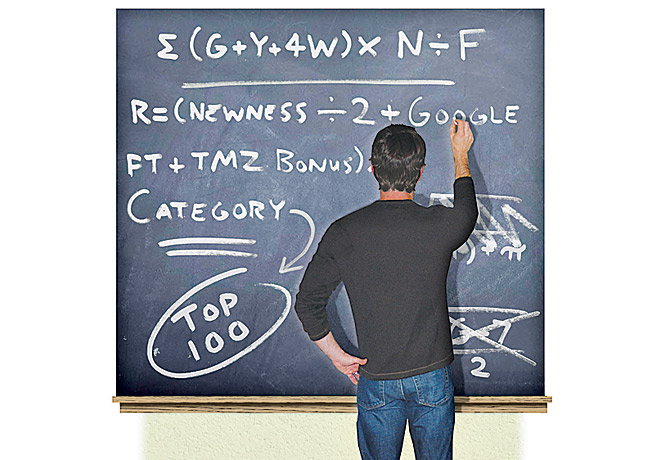
Numbering a list is a journalistic rule so obvious even E! understands it. But TIME's editors won't stoop to rank the TIME 100. No, they're afraid of hurting people's feelings or making a mistake. So, much like changing the watercooler bottle in the hall, it's up to me.
Unfortunately, this means doing some math, which confuses me greatly. I do, however, like making up formulas that make me look smart, so I came up with this:
Sigma (G + Y + 4W) * N / Y
This would calculate a person's influence by taking their Google hits, adding their YouTube hits and then adding the number of words in their Wikipedia entry multiplied by four (since it seemed that was going to be a small number). Then you simply multiply that sum by a number from 1 to 10 I'd make up to imply the person's newness (since President George W. Bush, for instance, is less influential now than he was seven years ago). Then you take the whole thing and divide it by another made-up number from 1 to 10 that would rate the person's frivolousness, so that Miley Cyrus won't win. I have no idea what that sigma symbol does, but it greatly improves the look of the formula.
Though I was still working out what to call my soon-to-be-famous formula ("Stein's Best but Only Theorem," "Stein's Razor" and "Suck on That, Mr. Natale, Who Thought I'd Never Learn Calculus" were under consideration), I called baseball statistician and 2006 TIME 100 member Bill James so he could marvel at my genius. It did not quite go that way.
He was, however, impressed with my gutsiness. "It's harder than anything I've conceived of doing," James said. Then he started spouting insane suggestions like figuring out how many people work for each TIME 100 member or how much e-mail each gets or a whole bunch of other stuff I ignored because it sounded like a lot of work. "My operating principle is thinking that when I was on the list, I would have been last. So I'm trying to think of ways that would make me last," he said. I am neither the first nor the last person to feel a great, sad desire to hug a baseball statistician.
James stressed that I shouldn't use raw numbers but instead rank each person from 1 to 100 for each stat and plug that into my formula. So I looked up everyone's Google hits and ranked each of them. Then, for newness, I looked up when they were first mentioned in TIME. To make up for the fact that Google hits underplay behind-the-scenes influence and are U.S.-centric, I also ranked people by their number of mentions in the Financial Times since 2003. I chose 2003 instead of the past 12 months because it's the default setting on the Financial Times website and by the time I figured that out, my wife was halfway through helping me, and if I had asked her to start over, I'd be divorced, dead or, worse yet, still punching names into ft.com.
For my formula, I took the newness rank and divided it in half, since this newness notion is a pretty stupid idea, really. Then I added the Google and FT ranks, plus six points (roughly 5%) as a bonus if they've never appeared on TMZ.com. Then, as James suggested, I used a multiplier to give 25% more weight to "leaders" than to "entertainers." In the end, my formula looked like this:
R = (N / 2 + G + FT + TMZ) * C
which looks lame, but at that point, I was exhausted and thinking about applying to FHM.com, where I bet editors rank women by sitting around and yelling about how hot they are.
But the results were pretty interesting (see them at time.com/joeltime100). The most influential person in the world is Vladimir Putin, who was TIME's Person of the Year in 2007. Nice job, TIME! Maybe you could have slipped me whatever formula you used for that when I told you I was writing this column.
Wendy Kopp, creator of Teach for America, is the least influential on the list, which I find believable since I've met her. Anyone who is spending time meeting me instead of attacking countries or finding oil probably isn't that influential. I also learned that Oprah (No. 16) has less influence than Lance Armstrong (No. 15), which I attribute mainly to the fact that my formula sucks. Still, it generally worked. Bush came in second, followed by Ben Bernanke.
And now that the list is properly ranked, I care about it more—and only partly because it will make the TIME 100 gala more tense (Bartholomew I to Lorne Michaels: "Dude, Suze Orman beat us? Come on! Oh, I should pay off my credit-card debt, you say? What a genius"). But also because I now know I have to bother reading only the articles about the first 25 names. Us mathematicians don't have tons of free time.